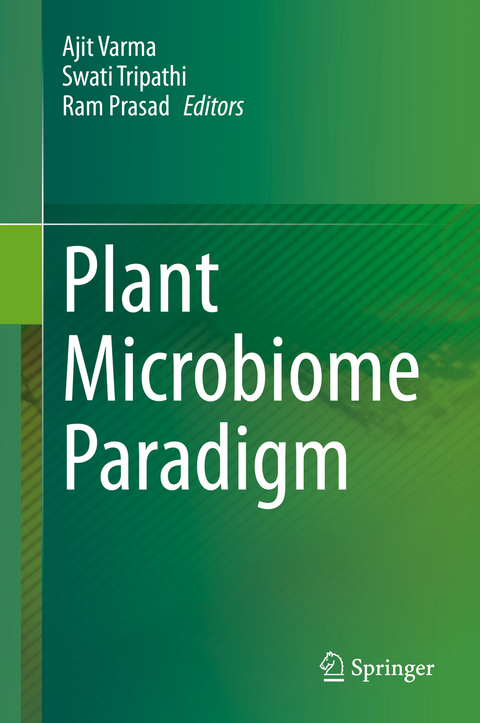
Plant Microbiome Paradigm
Springer International Publishing (Verlag)
978-3-030-50394-9 (ISBN)
This book provides a comprehensive overview of the current state of knowledge on plant-microbiome interactions and associations. It covers all major mechanistic approaches used to investigate microbes' impacts on plant growth promotion, disease control and health.
The industrial manufacture of nitrogen currently accounts for roughly 2% of the world's total energy consumption. Microbial products are expected to reduce the need for costly fertilizers, as well as chemical pesticides and fungicides. While beneficial microorganisms are increasingly being used in agriculture, abiotic and biotic stresses such as heat, drought, cold, and salt can quickly kill or render them useless in the field. However, discovering new and better treatments is a lengthy process due to the considerable microbial diversity found in soils.
Researchers have now proposed using biotechnological approaches to accelerate the process of microbial technology development. The fact that plant-associated microbes stimulate plant growth and development is well known, as the examples of rhizobia and mycorrhizal fungi show. The mechanisms by which these microorganisms maintain plant growth include the production of phytohormones, fixation of nitrogen, and the mobilization of phosphorus and minerals. The plant microbiome is also involved in pathogen suppression, and especially the root microbiome acts as a protective shield against soil-borne pathogens.
A special feature of this book is its multidisciplinary approach, spanning from plant microbiology/biocontrol, fungal and bacterial endophytes, plant physiology, to biochemistry, proteomics and genomics. It is ideally suited for researchers and student of agri-biotechnology, soil biology and fungal biology.
Prof Dr Ajit Varma : Professor Varma has completed his PhD at the age of 25 years from Allahabad University and Former Professor, School of Life Sciences, Jawaharlal Nehru University, India. Presently, he is the Distinguished Scientist & Professor of Eminence of Amity Institute of Microbial Technology; Pro-Vice Chancellor, Ritnand Balved Education Foundation, and Vice Chairman, Amity Science, Technology & Innovation Foundation Amity University Uttar Pradesh, India. He has published more than 314 papers in reputed journals and has been serving as an editor in Chief of Soil Biology Series, Springer Verlag Germany. Dr Varma is the Fellow of Alexander-von-Humboldt Society, Germany, elected Fellow of National Academy Agricultural Sciences and Fellow of Microbiology Society of India. Dr Swati Tripathi: Assistant Professor at Amity Institute of Microbial Technology, Amity University, Noida, India. She is working on plant microbe interaction, and microbial biotechnology. Dr Tripathi has a number of research papers and review articles to her credit in the journals of international repute. She has her post doctoral experience from South Korea and has been awarded Early Career Research Award recently. Dr Ram Prasad: Associate Professor at the Department of Botany, Mahatma Gandhi Central University, Motihari, Bihar, India. His research interests include applied and environmental microbiology, plant-microbe interaction, sustainable agriculture, and nanobiotechnology. Dr. Prasad has more than 150 publications to his credit, including research papers, review articles & book chapters, has five patents issued or pending, and has edited or authored several books. Previously, Dr. Prasad served as an Assistant Professor at Amity University, Uttar Pradesh, India; Visiting Assistant Professor, Whiting School of Engineering at Johns Hopkins University, USA; and Research Associate Professor at the School of Environmental Science and Engineering, Sun Yat-sen University, China.
Interaction of Epiphyllic Bacteria with Plant Cuticles.- Plant Microbiome and Its Important in Stressful Agriculture.- Plant-Microbe Interactions: Applications for Plant-Growth Promotion and In-Situ Agri-Waste Management.- Plant-Microbe-Metal Interactions: A Biochemical and Molecular Analysis for Phytoremediation.- Ecosystem Diversity as a Function of Plant and Soil-Microbe Interactions.- Plant Growth Promoting Potentials of Endophytic Fungi for the Management of Agricultural Crops and Grasses.- Biological Control of Plant Diseases: Opportunities and Limitations.- Circadian Redox Rhythms Play an Important Role in Plant-Pathogen Interaction.- Rhizospheric Microorganisms for the Remediation of Contaminants for Ecological Restoration.- The Rhizosphere Microbiome: Microbial Communities and Plant Health.- On the Possibility of Accelerating Succession by Manipulating Soil Microorganisms.- Composition and Dynamics of Microbial Communities in Fly Ash-Amended Soil.- Molecular Insight into Plant-Fungal Pathogen Interaction: Emerging Trends and Implication in Designing Climate Smart Filed Crops.- Biochemical Dynamics of Plant Microbe Interactions.- Endophytic Secondary Metabolites for Biological Control - A Latest Perspective.
| Erscheinungsdatum | 30.08.2020 |
|---|---|
| Zusatzinfo | VI, 307 p. 31 illus., 22 illus. in color. |
| Verlagsort | Cham |
| Sprache | englisch |
| Maße | 155 x 235 mm |
| Gewicht | 631 g |
| Themenwelt | Naturwissenschaften ► Biologie ► Botanik |
| Naturwissenschaften ► Biologie ► Mikrobiologie / Immunologie | |
| Naturwissenschaften ► Biologie ► Ökologie / Naturschutz | |
| Schlagworte | Abiotic Stress Management • Bioactive Compounds • biocontrol • Biological Control • Methylobacterium • Microbiome Community Interactions • plant-microbe interactions • plant microbiome • Plant-Microbiome Interactions • plant-pathogen interaction • Plant productivity • Rhizosphere Microbiome • soil microbial community • sustainable agriculture |
| ISBN-10 | 3-030-50394-1 / 3030503941 |
| ISBN-13 | 978-3-030-50394-9 / 9783030503949 |
| Zustand | Neuware |
| Haben Sie eine Frage zum Produkt? |
aus dem Bereich


